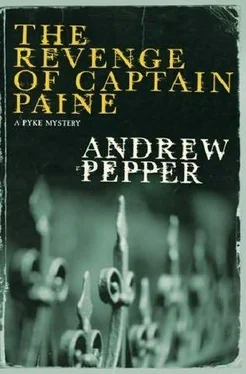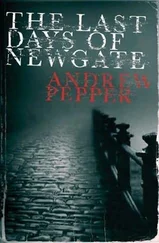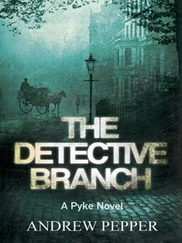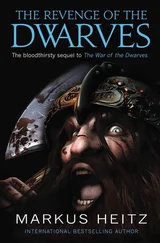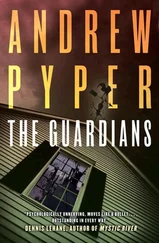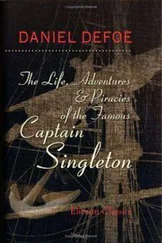Andrew Pepper - The Revenge of Captain Paine
Здесь есть возможность читать онлайн «Andrew Pepper - The Revenge of Captain Paine» весь текст электронной книги совершенно бесплатно (целиком полную версию без сокращений). В некоторых случаях можно слушать аудио, скачать через торрент в формате fb2 и присутствует краткое содержание. Жанр: Исторический детектив, на английском языке. Описание произведения, (предисловие) а так же отзывы посетителей доступны на портале библиотеки ЛибКат.
- Название:The Revenge of Captain Paine
- Автор:
- Жанр:
- Год:неизвестен
- ISBN:нет данных
- Рейтинг книги:5 / 5. Голосов: 1
-
Избранное:Добавить в избранное
- Отзывы:
-
Ваша оценка:
- 100
- 1
- 2
- 3
- 4
- 5
The Revenge of Captain Paine: краткое содержание, описание и аннотация
Предлагаем к чтению аннотацию, описание, краткое содержание или предисловие (зависит от того, что написал сам автор книги «The Revenge of Captain Paine»). Если вы не нашли необходимую информацию о книге — напишите в комментариях, мы постараемся отыскать её.
The Revenge of Captain Paine — читать онлайн бесплатно полную книгу (весь текст) целиком
Ниже представлен текст книги, разбитый по страницам. Система сохранения места последней прочитанной страницы, позволяет с удобством читать онлайн бесплатно книгу «The Revenge of Captain Paine», без необходимости каждый раз заново искать на чём Вы остановились. Поставьте закладку, и сможете в любой момент перейти на страницу, на которой закончили чтение.
Интервал:
Закладка:
On that Monday Pyke waited, at the address he’d designated in Somers Town, for Abraham Gore, who would have been expecting to meet Sir Henry Bellows, but the banker and railwayman didn’t show up, nor was any explanation offered as to why he had turned down his friend’s plea for help. Later, Pyke heard a rumour that he was too ill to travel. Undeterred, Pyke passed word to the prime minister that Gore was to be delivered, without further delay, to Hambledon.
In terms of the railway, it didn’t take long for the bickering to start. The suppliers, many of whom hadn’t been paid for what they had sent to the subcontractors, demanded what was owed to them because they too were being hounded by those who provided the raw materials. The subcontractors, who had lost everything in the fires Pyke had started, then demanded money owed to them by the Grand Northern, and the railway company, in turn, went cap in hand to the proprietors for additional funds — because its own reserves had been depleted by the expense of having to buy land for building on at extortionate prices. News of the devastation quickly reached the City and the scale of the damage was reported in all the newspapers. All condemned it as a ‘terrorist outrage’ and called for the perpetrators, particularly the mysterious figure known as Captain Paine, to be hunted down and then hung, drawn and quartered. The immediate effect was a cataclysmic fall in the Grand Northern’s share price. For the previous few weeks, buoyed by rumours that a new chairman would focus resources on completing a section of the line by the end of the following year, the share price had risen from a low of eleven pounds to almost thirty-seven pounds on the morning of the attacks. By the next day the price had slumped to less than ten pounds, and by the end of the week, amidst growing rancour, trading in Grand Northern’s shares was suspended when the price fell to nothing. Investors who had been tempted by the lure of rising share prices and quick profits saw the value of their holdings decimated. Overnight people’s life savings were destroyed. Certainly these same people were in no mood, or indeed no position, to pay a penny to the company when, more out of desperation than judicious thinking, it put out a call to proprietors for the next instalment of capital. By law the proprietors were obliged to cough up what the company demanded. None of them did, of course, and the entire system ground to a standstill. The spectre of mass bankruptcy began to hover over people’s heads.
Just when it looked as if the situation couldn’t get any more serious, Pyke moved to intensify the crisis. In his last days at Blackwood’s bank, he had borrowed a large sum of money on short notice from a bill-broking friend who, under Pyke’s instructions and in the wake of the financial crisis that was threatening to engulf the entire City, recalled the loan. With too little held in reserve to meet this debt, William Blackwood had no choice but to call in the money Blackwood’s had loaned the Grand Northern — all one hundred thousand pounds — to cover what it owed. He had to give a significant period of notice, of course, but since everyone knew that the Grand Northern was in no position to pay back the loan and had no funds to begin the enormous task of repairing the damage, those who had deposited their hard-earned savings with Blackwood’s started to demand their money back. Overnight panic among its customers spread, and by the middle of the week there were queues stretching down the stairs from the main banking hall into Sweeting’s Alley and along Cornhill as far as Bishopsgate. The bank’s already depleted reserves could not meet this demand and despite the large sums of his own money that Gore ploughed into it to plug the hole, Blackwood’s was forced to close its doors to note-holders and depositors: the crisis had gained its first casualty. Later on, it was reported that the bank’s chairman, William Blackwood, had slit his wrists with a razor and bled to death in his own home.
As the situation started to unravel further, calls for the government to intervene and bail out the Grand Northern — or at the very least make available funds so that it could pay off some of its creditors and start the clean-up work — intensified. Newspaper editors demanded that Melbourne’s cabinet take immediate action to restore confidence in the battered financial system and prop up the ailing railway company. Investors who had lost their life-savings when the Grand Northern’s shares were rendered worthless marched on Whitehall demanding recompense. Everyone, it seemed, expected the government to step in and announce a series of measures that would alleviate the problem, but it did nothing. And when the government did nothing, pressure was brought to bear on the opposition to take a stance but the Tory leader, Robert Peel, was apparently unwell and convalescing at his country home.
During this time, despite the near-continuous delegations that were sent to Pyke’s new home in Berkeley Square, and the Hambledon estate, begging that he at least discuss the situation with representatives sent by Melbourne and Peel, Pyke turned them away with a simple message. They knew what he wanted; if he didn’t get what he wanted, the threat of a Cumberland monarchy remained.
During this time, Pyke dozed fitfully at night and sleep-walked through the day drugged on laudanum. If he shut his eyes, she was there; if he saw faces moving towards him in a crowd, she was among them; if he walked into a room, it was as though she’d just left, a trace of her perfume lingering in the air. At night, she would come to him in his dreams, begging him to find Felix and telling him not to give up on himself. Pyke found there was something reassuring about those dreams until Emily’s face transformed into a grinning demon and all he could hear were the same words repeated over and over: when will it all be enough? He would wake up, his body drenched with sweat, disoriented until he remembered where he was and what had happened, and then a feeling of shame, guilt and loss would wash over him until he could lie there no more. On such occasions, he would reach for his laudanum and kill the time until dawn walking the dark corridors of the old hall, thinking about what he might have done, what might have saved Emily’s life. He would pause only in Felix’s room, and he might pick up his son’s blanket, bring it to his nose and inhale the scent, trying to keep alive, if only in his own mind, the hope that Felix wasn’t dead; that something good might yet come from the hole he had dug himself.
Bentley’s jewellers was a tall, narrow shop on the south side of the Strand, a little before Temple Bar, in between a bookseller and a stationer’s. Inside was a cornucopia of silver and gold bracelets, pins, necklaces, rings and timepieces of every size, make and denomination. Townsend had already explained to the owner, Jeremy Bentley, what was going to happen — and he’d already been well paid for his services — so that when the bell rang at the front of the shop, just before closing time, indicating that their visitor had arrived, Pyke retreated to the back room and waited, while Bentley introduced himself and invited the new arrival to join him in the parlour, where the light was better and they wouldn’t be interrupted. Bentley stepped to one side and allowed the customer to enter the back room first; Pyke was waiting for him and after a few moments, Jem Nash knew he was trapped. It was written all over his face: the shock, the thought of escape, the fear and finally the resignation.
Pyke shoved Nash down into a chair. For some reason, his assistant looked older, as though the difficulties of the previous month had aged him beyond recognition. His once sparkling eyes were lifeless; his skin was grey and his hair seemed suddenly thinner. Bentley had left them alone, as he’d been instructed to do, and for a while, the only noise in the building was the sound of the ticking clocks. Pyke held out his hand and said, ‘The watch, if you please.’ He added, almost as an afterthought, ‘The watch you stole from Morris when you killed him.’
Читать дальшеИнтервал:
Закладка:
Похожие книги на «The Revenge of Captain Paine»
Представляем Вашему вниманию похожие книги на «The Revenge of Captain Paine» списком для выбора. Мы отобрали схожую по названию и смыслу литературу в надежде предоставить читателям больше вариантов отыскать новые, интересные, ещё непрочитанные произведения.
Обсуждение, отзывы о книге «The Revenge of Captain Paine» и просто собственные мнения читателей. Оставьте ваши комментарии, напишите, что Вы думаете о произведении, его смысле или главных героях. Укажите что конкретно понравилось, а что нет, и почему Вы так считаете.
